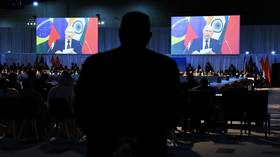Putin outlines objectives for Russia’s BRICS presidency

Russia has assumed the one-year rotating presidency of BRICS following its groundbreaking expansion in 2023. President Vladimir Putin has vowed that Moscow will do its best to promote cooperation within the economic bloc.
In a statement released by the Kremlin on Monday – the first in 2024 – Putin hailed the expansion of BRICS, calling it “a strong indication of the growing authority of the association and its role in international affairs.”
In August, the bloc, which at the time included Brazil, Russia, India, China, and South Africa, agreed to admit Saudi Arabia, Iran, Ethiopia, Egypt, Argentina, and the United Arab Emirates, while leaving the door open to accepting new members. Argentina, however, officially declined the invitation after its newly-elected president, Javier Milei, opposed the move, promising that the country would not “ally with communists” on his watch.
The Russian leader stressed that Moscow’s chairmanship, with the motto ‘Strengthening Multilateralism for Equitable Global Development and Security’, will “focus on positive and constructive cooperation.”
According to Putin, Moscow intends to enhance partnership in politics and security, economic and financial matters, and cultural and humanitarian contacts, while providing “effective responses to the challenges and threats to international and regional security and stability.”
“Our priorities include promoting cooperation in science, high technology, healthcare, environmental protection, culture, sports, youth exchanges, and civil society,” he added.
Commenting on the recent additions to BRICS, Putin also said that Moscow plans to “facilitate the harmonious integration” of new participants in all spheres, noting that around 30 countries have expressed a desire to join the bloc’s agenda in one form or another. “To this end, we will start working on the modalities of a new category of BRICS partner country.”
Russian Deputy Foreign Minister Sergey Ryabkov has said that BRICS plans to agree on a list of partner countries before the group's summit, which is scheduled for October 2024 in Kazan, adding that some Latin American countries could receive this status.
Originally formed in 2009, BRICS presents itself as an alternative to Western-dominated international institutions. According to the IMF, the expanded BRICS now accounts for 36% of global GDP in terms of purchasing power parity, surpassing that of the G7, an informal grouping of Western countries.














